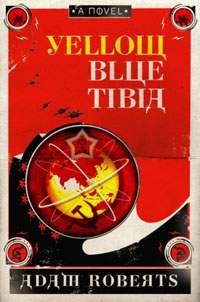By Adam Roberts

Our story follows one of their number, Konstantin Svorecky, as an old man, bitter and world weary, eeking out a living as an interpreter in Gorbachev's mid-80's days of perestroika. What starts as an ordinary job interpreting for a pair of visiting American Scientologists and a chance meeting on the street with one of his writer colleagues - one he had presumed dead - starts a chain of events that will see him uncover a plot to blow up Chernobyl, be charged with murder, get chased across Russia by the KGB in the taxi of an intensely OCD nuclear physicist all the while dodging assassins and wondering what all this has to do with the story he and his fellow sci-fi writers hatched all those years ago. Do the aliens really exist? Or is he surrounded on all sides by madmen?
If you think it all sounds like a madcap farce I'm not surprised, there are times when it reads like one, but Yellow Blue Tibia is much more than that. For a start it takes the very genre it purports to be a part of - award nominated for, in fact - and while presenting it as the most communist of literary genres, trying to use rational science to reshape an irrational world into a perfectly defined, fully explainable place he then introduces the possibility of aliens into the impenetrable bureaucracy of the ailing communist regime and delights in watching it fall apart in its efforts to cope with the intrusion.
Without trying, Roberts also very cleverly demonstrates the drabness of Soviet Russia, the resentment, mistrust and the hopelessness of the people trapped in a crumbling system that won't allow them to break free, and this is brilliantly and succinctly demonstrated at the beginning of book as we see Svorecky's life and his career as a novelist crumble and fall through two failed marriages, numerous failed jobs, alcoholism and loneliness perfectly précised in a few pages.
But the over-riding element of this fabulous book, like a lot of Roberts work, is the great humour he injects into the writing. Each of the cast of characters is beautifully drawn, albeit with a broad brush, from the slow-witted KGB Agent Trofim and his Boss, ex-writer, Frenkel, to the love interest in the overly ample form of US Scientologist Dora and the gloriously OCD Physicist, Saltykov who, along with Svorecky provided, for me at least, one of the greatest double acts since Lemmon and Matthau and between them had me in bits with laughter. Stylistically too the narrative is very funny, told in the first person by Svorecky with a very dry wit, and interestingly, as the one man who always insists on telling the truth, the ability to make you laugh by making a simple truth sound so unlikely and implausible.
If there is a criticism, and I guess there has to be, it's in the science-fiction part of the book with the revelation of the multiverse and its many diverging and converging timelines. It's unsatisfactory in many ways feeling, as it does, kind of crow-barred into the ending as a means to an end and there are a couple of other, similar SF sections that are never fully explored and as such throw you out of the story rather than pull you further in.
But it would be churlish to let this put you off. Yellow Blue Tibia is a tremendous book, engaging, entertaining and about as funny as anything I've ever read and I would recommend it to everyone, especially folk who usually disdain science fiction. And if anyone is paying attention it would make a wonderful film, one I would gladly pay to see.
As we all know by now it didn't win the Arthur C Clarke Award and I'm not surprised. Good though it is it does feel lightweight compared some of the other work on the shortlist and you can't help thinking that it's this flippancy that held it back. Is that fair? I've no idea, but if I had to give a reason for it not winning, that would be it.
Yellow Blue Tibia is published by Gollancz and is available from Play.com, Blackwell and all good book stores.